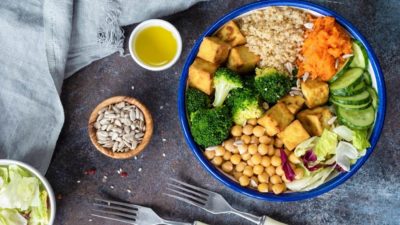Running – distances from 10k up to a marathon

Nutrition requirements:
Long distance running requires a lot of stamina and is a true endurance sport. Therefore, you’ll have to increase your energy intake, hydration and choose nutrient-dense foods for good recovery. On long training days you should eat more than on recovery days. About three days before a race, most runners do carb-loading to maximise their glycogen stores – it means increasing your carb intake whilst not training and reducing your fat intake.
In general, you need increased amounts of complex but also some simple carbs for energy, good amounts of protein and also healthy fats.
Key points:
1. Before training, about 90-40 minutes prior, have a light carb-based snack so your body gets some extra energy. It can be a piece of fruit, fresh smoothie, a fruit and nut snack bar, or a small portion of muesli/granola. Eating closer to training might make you feel sick later so be careful.
2. For long-distance training, you need to top up carbs on the go to prevent muscle fatigue and stay alert. You can carry some dates with you or blend dates with water for a sweet energy drink (if you add a small pinch of salt to it, you’ll make it an isotonic drink). Other options include bananas, mashed sweet potato with cinnamon and raisins (instead of energy gels), chocolate-covered rice cakes, energy balls and more. You need about 30-60 g of carbs per hour.
3. Hydration is crucial! Water is great for shorter runs but for longer distances, an isotonic drink helping you replenish lost minerals and some sugar is a must. You can combine your carb top up with an isotonic drink (the date drink mentioned above) or carry a separate bottle/camelback.
4. Post-run, eat or drink a recovery meal within 40 minutes so nutrients get to your muscles and other tissues quickly and ensure optimal recovery. This should contain good amounts of carbs to replenish muscle glycogen and protein for tissue repair. It can be a protein shake with some dried fruit, fresh fruit smoothie and a protein bar, a smoked tofu sandwich or a falafel wrap, lentil soup with wholemeal bread, or granola with protein powder.
5. As you’re burning a lot of energy, some healthy fats are needed to top up your energy levels and nourish your body. Add nut butters, avocados, nuts and seeds or small amounts of cold-pressed rapeseed and olive oil to your meals.
Sample Meal Plan: Endurance Athlete for training days and Active Person for recovery days.
Inspiration: Lisa Gawthorne, Ben Dame, Laura Kline, Helen Fines, Fiona Oakes, Ellen Jaffe Jones
Fiona Oakes, international marathon star and multiple record-holder: “I like to encourage people to think about veganism in a positive way. I try to break down stereotypes and myths attached to veganism by my actions. I am one of only 800 female fire-fighters in the UK – a job which people don’t expect to see a female doing, let alone a vegan one. I run endurance events, a thing which people don’t think you can do if you are a ‘weak vegan’.”







